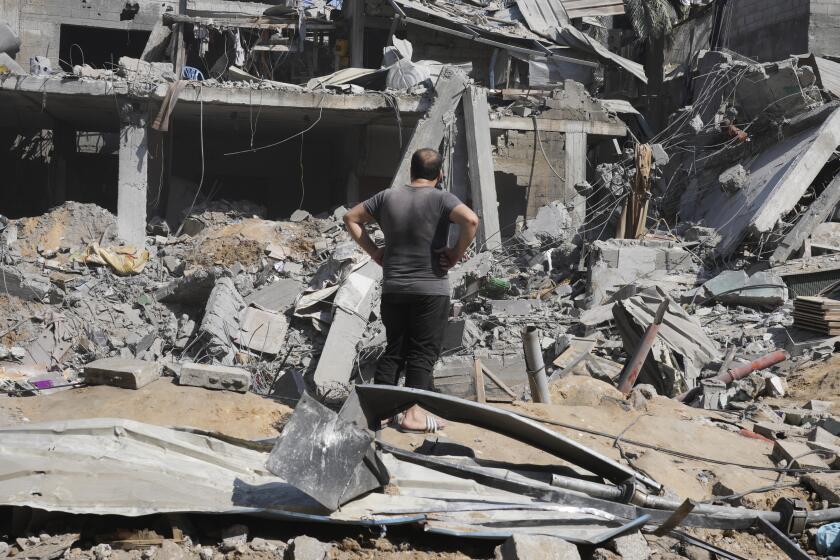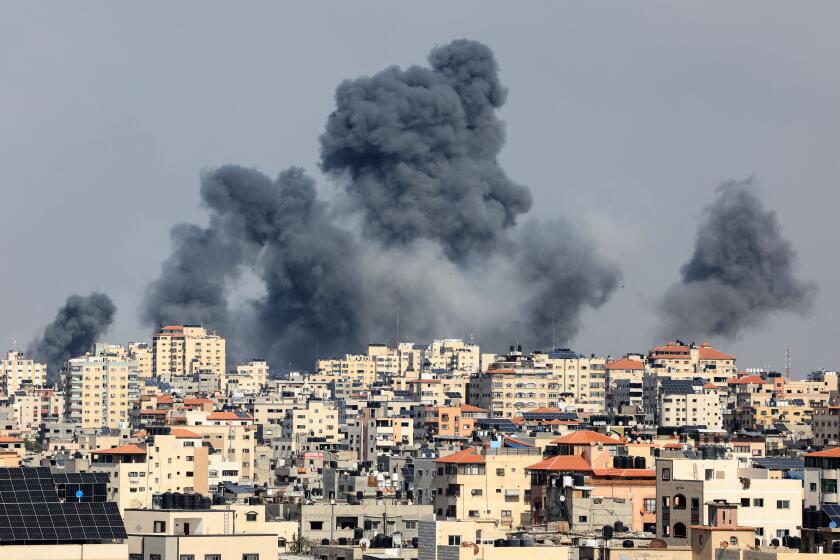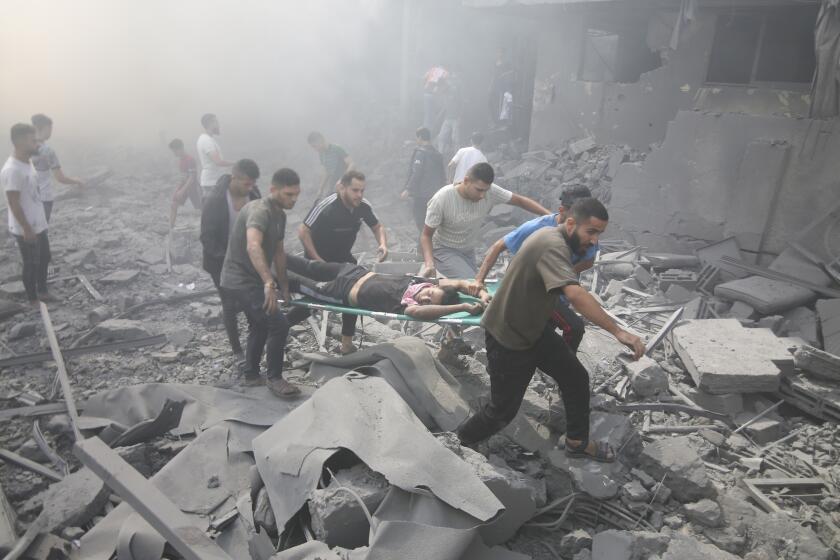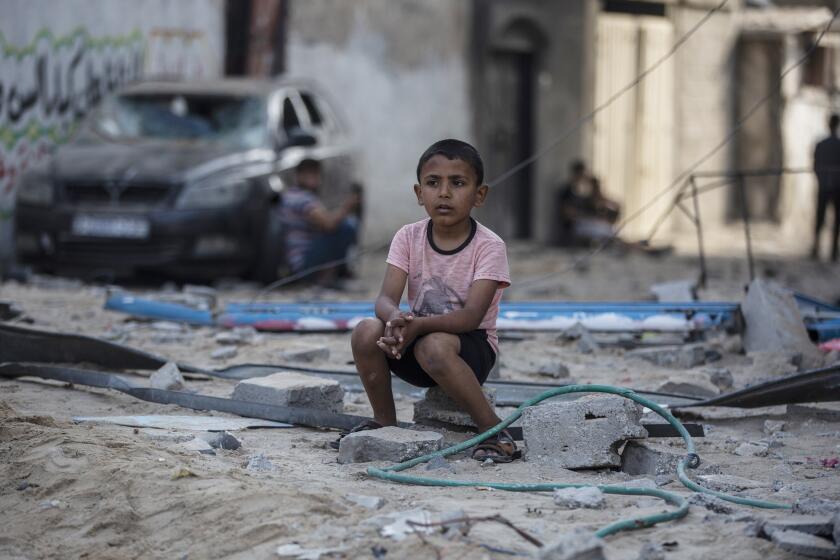Palestinian Christians are losing loved ones in Israel’s bombing in Gaza. Where’s the outcry from Western Christian communities?
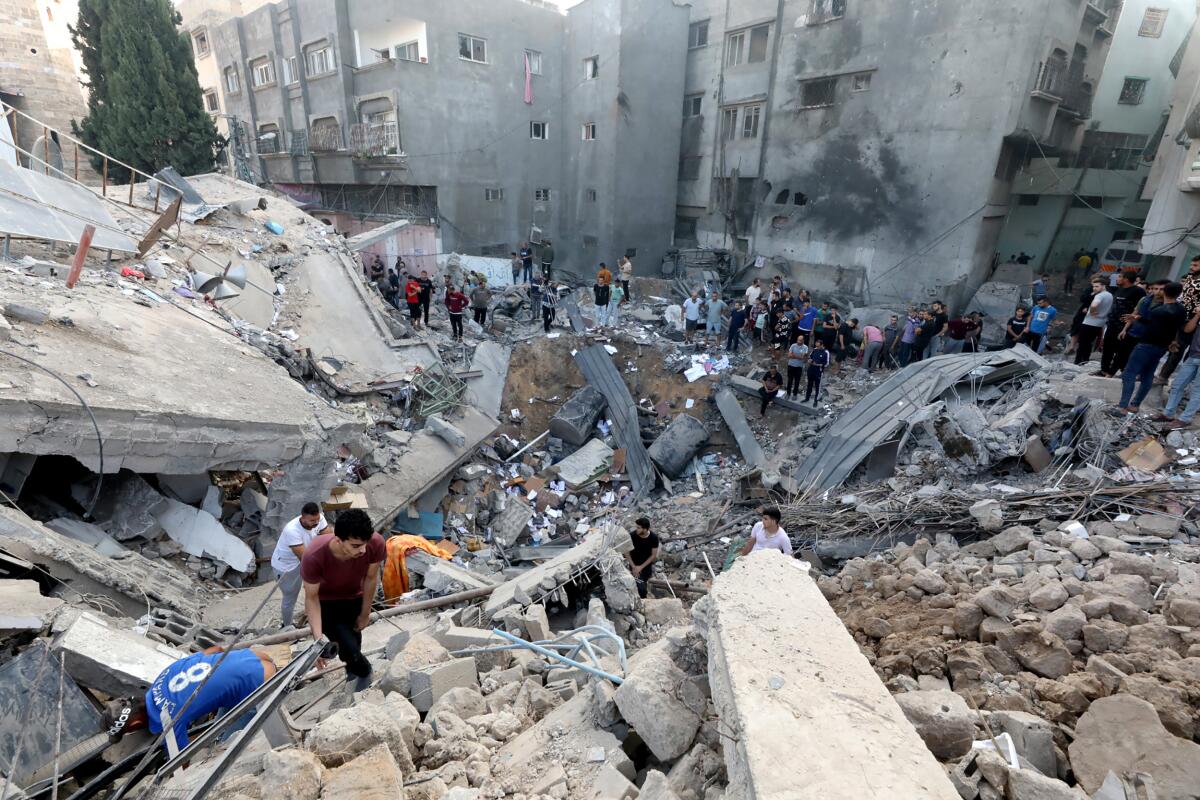
- Share via
Like other Palestinians and Israelis with family members in Palestine/Israel, I have found the latest and unprecedented outbreak of violence between Israel and Hamas hitting closer and closer to home. My dread became reality on Oct. 20 upon hearing from Tanya, one of my relatives. Her family lost a loved one who had been sheltering in the Greek Orthodox Church of St. Porphyrius in Gaza, one of the world’s oldest churches. An Israeli airstrike hit one of the four compounds of the church, killing 18 Palestinian Christians, and injuring at least 20.
Amidst the grief, Tanya reminded us to celebrate Aunt Elaine, our relative, who was a devoted teacher and school principal. She was killed in the bombing. Tanya said: “Gaza is all our family. The neighborhood was bombed. The walls are standing but our homes are destroyed. This time is beyond anything we’ve witnessed, and we all thought we witnessed the worst.”
My beloved Gaza of crowded markets and vibrant cafes is gone, demolished and a place of grief
My sisters are taking refuge north of Gaza City in a hospital and a school operated by the United Nations, but no place in Gaza is safe.
My social media feed was then saturated with family, community members and others mourning the dead. In one post, a photo showed a couple, the husband in a blue suit and red tie, embracing his wife in a blue-and-white dress. I learned from Tanya they were Marwan, an art teacher with the Catholic Church, and Nana, who worked for the United Nations in Gaza. “RIP,” the caption read. “We love you all — You are in a better place.”
Then a message from former Michigan Rep. Justin Amash, who is Palestinian American, went viral. In a post with more than 20 million views, Amash announced that several of his relatives, including two of his cousins, Viola and Yara, were also killed in the church blast. He added a picture of the two young women, dressed in Christmas colors, with holiday lights, a wreath, tree decorations and a Santa hat behind them. In a subsequent post, he shared, “My family and I would like to express our heartfelt appreciation for the many kind and gracious messages of condolence for our beloved cousins in Gaza.”
As Israel is poised for a ground invasion of Gaza, and bombing continues, people fear that the goal is to empty the place of Palestinians.
Elaine, Marwan, Nana, Viola and Yara were among the remaining 1,000 Christians in the Gaza Strip. While most Palestinian Christians in the Occupied Territories reside in the West Bank, the number of Christians in Gaza, and across Palestine/Israel, has been dwindling to less than 2% of the overall Palestinian population. Most members of these communities have migrated to Europe and North America seeking economic stability and peace of mind.
Yet across the diaspora, the images of death and destruction from Gaza reignite traumas among Palestinian Christians and Muslims around the world. The 2.3 million residents of this besieged land do not have safe zones or shelters. Since the horrific attacks of Hamas against Israel on Oct. 7, Israeli bombardment of Gaza has led to the deaths of more than 8,000 individuals, disproportionately children. Many are injured or remain trapped underneath the rubble, and there’s difficulty rescuing them as hospitals are collapsing, and Israeli-imposed shortages of water, food, medicine and electricity are excruciating. The Christian community had to hold a mass funeral to bury the dead outside of the Church of St. Porphyrius, followed by a mass baptism service for the children of the community in case they, too, may soon die.
Will reducing Gaza to rubble actually achieve long-term security for Israel? Are there no other, more effective ways to neutralize Hamas that Israel hasn’t yet tried?
There is fear now that the Christian presence in Gaza, and across Palestine, may ultimately disappear altogether. The rubble lying around the Church of St. Porphyrius is heartbreaking, particularly when considering its symbolism for the community and the church’s rich history. “The Church of St. Porphyrius’s original structure dated to the 5th century, and the current structure, in a historic quarter of the city, was built in the 12th century. It is named for a former bishop of Gaza, Saint Porphyrius, and placed where he is believed to have died in A.D. 420,” according to the Washington Post.
And the heartache continues to unfold in Gaza — with reverberations far and wide. On Oct. 30, the Rev. Mitri Raheb, a Bethlehem-based Palestinian Lutheran leader in the West Bank, shared that “an Israeli air strike bombed the Arab Orthodox Cultural and Social Center in Gaza, a brand new and state-of-the-art building that houses most of the Christian activities in Gaza, destroying the main auditorium.” Before-and-after images circulating widely on social media juxtapose what was a beautiful and modern community center, now amid rubble.
Palestinian Christians, descendants of the oldest Christian communities, feel largely abandoned by the world — particularly by other Christian communities in Western countries — who seem indifferent or even hostile to the Palestinian struggle for freedom and human rights.
Israel struck the Jabaliya refugee camp in the Gaza Strip Tuesday. Palestinians have experienced a long cycle of displacement within and beyond Israel’s borders.
Palestinians, both Christian and Muslim, are subjected to collective punishment from Israeli bombardment, and we are praying for a cease-fire between Israel and Hamas. U.N. officials have called for the prevention of ethnic cleansing and genocide in Gaza. A recent poll also found that 80% of Democrats and 56% of Republicans believe that the United States should call for a cease-fire.
I hope that every form of violence and oppression in Palestine/Israel will end — sooner rather than later — so that Jews, Christians and Muslims can share the land as equal neighbors. Regardless of faith or ethnicity, we deserve to live in peace and security.
Sa’ed Atshan is a professor of peace and conflict studies and anthropology at Swarthmore College.
More to Read
A cure for the common opinion
Get thought-provoking perspectives with our weekly newsletter.
You may occasionally receive promotional content from the Los Angeles Times.
